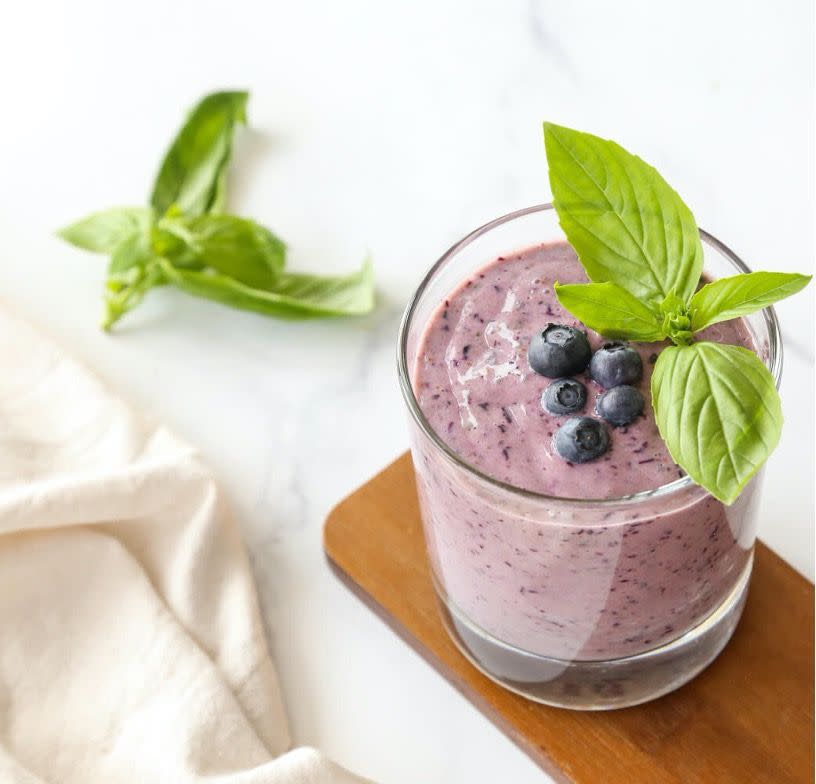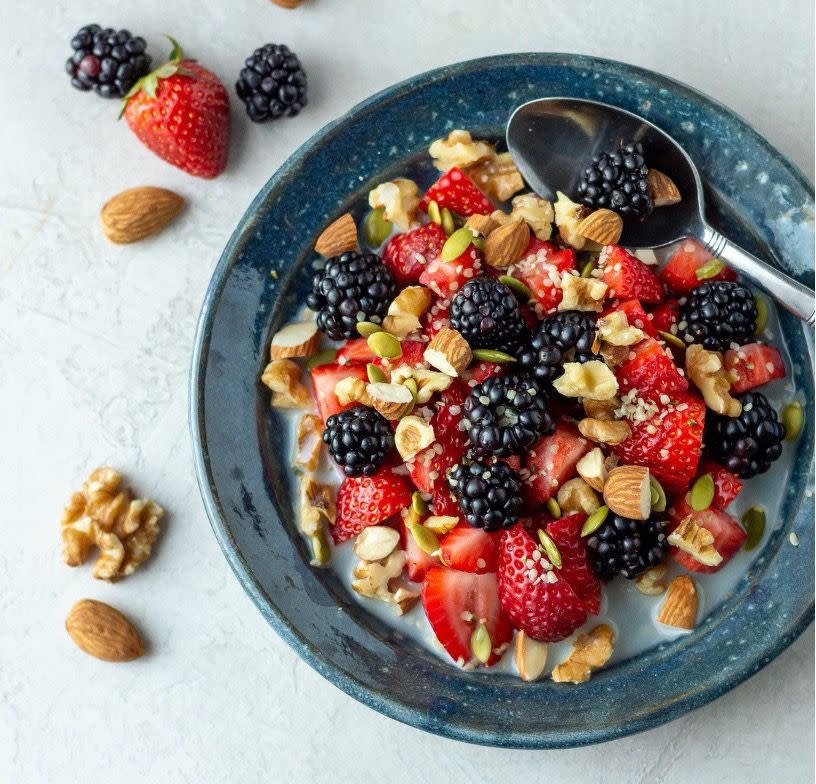7 ways to boost your productivity this autumn

The post-summer lull can often leave us feeling demotivated and unproductive, and this can interfere with daily routines as we embark on a new season. Given how diet contributes to overall health and wellbeing in a monumental way, ensuring you are eating the right foods to help boost productivity and brain function is imperative at this time of year. When we are eating foods rich in vitamins, minerals and antioxidants we feel nourished and alert, whereas a diet high in fat and sugar can zap energy and motivation.
Here, London-based dietitian and nutritionist Reema Patel of Dietitian Fit & Co reveals the seven foods which are proven to help support productivity and brain health, as well as sharing some recipe ideas that incorporate these ingredients.
1) Whole grains
“Some fantastic examples of whole grains include wholewheat oats, brown rice and bread, quinoa, buckwheat and bulgur. Whole grains are high in fibre, which provides many health benefits. Research has shown that a high fibre intake is linked with lower levels of anxiety and depression. Dietary fibre is also beneficial for our gut microbes, which are linked to supporting our mental health and wellbeing. To increase your dietary fibre intake, swap white pasta for brown, or combine a mix of both to ease you into the different taste. And switch up the grains you use at dinner – try quinoa instead of rice or couscous, or bulgur wheat in a salad or soup.”
2) Coffee
“That morning coffee may provide you with some great health benefits – including increasing alertness and concentration, as well as improving mood and limiting depression. Everyone has a different tolerance level to caffeine, and too much may cause a small risk of anxiety and sleep disturbance, so it is important to know how much makes you feel good.
“Taking a proper break in the day away from screens and enjoying a nice cup of coffee can be a great routine to get into. Some research has shown that decreased sun exposure can increase probability of cognitive decline – so why not enjoy a refreshing coffee on a walk, get in some sunshine and exercise all at the same time.”
3) Blueberries
“Blueberries, as well as other dark red and purple fruits and vegetables, contain compounds called anthocyanins, which are a type of polyphenol. Anthocyanin consumption has been linked to improving memory and cognitive deficits. All berries are also a good source of vitamin C, which has been shown to manage anxiety and stress. Interestingly, Vitamin C deficiency has been linked to dementia and Alzheimer’s disease.”
4) Walnuts
“Walnuts are high in vitamin E, which has been shown to reduce cognitive decline as we age. They are also a great plant source of omega 3 fatty acids. Polyphenols found in walnuts may help reduce oxidative stress and inflammation in the brain, which otherwise can increase risk of Alzheimer’s disease. Eating walnuts has been linked to better overall brain function as we age. My top tips for adding walnuts to your diet include chopping them into small pieces and sprinkling onto your morning porridge or yoghurt bowls, into smoothies or even in salads. If you are feeling fancy, try making your own pesto using walnuts instead of pine nuts – it’s delicious.”
5) Eggs
“Eggs are an excellent source of B vitamins, including vitamins B1, B3, B6, B12 and folic acid. Egg yolks are rich in choline, which contains the chemical acetylcholine, known for its memory-boosting properties.
“Eggs are a great choice for breakfast, scrambled or in an omelette with vegetables, or try a beautifully spiced egg curry for dinner. If you do not eat eggs, look for fortified plant foods containing B12 and other B vitamins such as plant-based milk alternatives and cereals.”
6) Oily fish
“The specific nutrients found in oily fish to help support productivity and brain health are the omega-3 fatty acids. Much of the fat in our brain is composed of these fatty acids, and they are important for building nerve cells. Omega-3 intake has been linked to slowing down dementia, so including at least one portion of oily fish a week could certainly support our overall cognition. Think of sources such as mackerel, salmon, trout, sardines, anchovies and herring. You could try a mackerel and baby potato salad, with asparagus and juicy cherry tomatoes. Or enjoy some trout on the barbecue, finished off with a squeeze of lemon, served alongside some delicious smoky vegetables.
“If you don’t eat fish, don’t worry: you can also get omega-3 fatty acids from plant-based sources such as flaxseed, pumpkin seeds and walnuts. Although these are not the optimal type of omega 3 for brain health, the body can convert these into the more optimal forms, which are called docosahexaenoic acid (DHA) and eicosapentaenoic acid (EPA). You may also consider taking an algae-based supplement, as these contain good levels of DHA and EPA.”
7) Dark chocolate
“Chocolate; who doesn’t love it? While it may have a mixed reputation in terms of health, the good news is that chocolate – in particular dark chocolate with higher levels of cocoa solids – is a good source of polyphenols, which can be important for brain health. Studies have shown that regular dark chocolate consumption can increase blood and oxygen flow to the brain, with young adults showing better cognitive performance. Combining dark chocolate and berries is our ultimate winning combination for a double boost in polyphenols, whilst enjoying something delicious.”
Easy recipes incorporating these foods
Blueberry Basil Smoothie

Ingredients:
150 grams blueberries (fresh or frozen)
Unsweetened oat milk
Chia seeds
5 grams basil leaves
Add maple syrup or honey if you like it sweet
Directions: Add all the ingredients into a blender and blend until smooth. Pour into a glass and enjoy! (One serving is equal to approximately 1 1/2 cups.)
Berry and nut breakfast bowl

Ingredients:
70 grams chopped strawberries
70 grams halved blackberries
15 grams chopped walnuts
15 grams chopped almonds
5 grams pumpkin seeds
5 grams hemp seeds
10 grams unsweetened plant milk
(Additional topping ideas: Add a pinch of cinnamon, shredded coconut, additional nuts and seeds, a dollop of yogurt or a drizzle of honey.)
Directions:
Add strawberries and blackberries to a bowl. Top with the nuts and seeds. Pour the almond milk over top and enjoy.
Leftovers can be refrigerated in an airtight container for up to two days.
Eggs in a butternut squash nest

Ingredients:
100 grams butternut squash spiralised into noodles (can be done with sweet potato, beets or courgette instead)
Coconut oil
2 eggs
Sea salt and black pepper (to taste)
10 grams microgreens (optional)
Directions:
Use a spiraliser machine to create spirals with the long part of the butternut squash, not the bulb. (Peel first and then cut in half horizontally to spiralise.) Form the spiralised squash noodles into nests, making a small well in the centre for the egg.
Heat a pan over medium heat and add the coconut oil. Use a spatula to transfer the squash nests to the pan and cook for about seven minutes.
Crack the egg into cups and transfer into the well of the squash nests. Cook for about three-to-four minutes or until the whites have set to your liking. Cover the pan with a lid to speed up the cooking time.
Transfer the egg nests to a plate and season with sea salt and black pepper to taste. Garnish with microgreens (optional).
You Might Also Like


